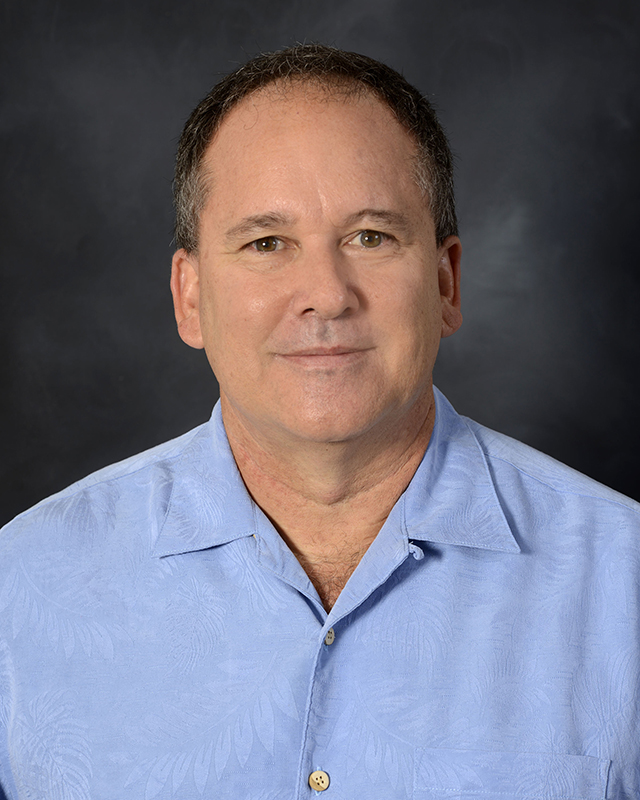
Dr. Wade Jeffrey
- Position: Director of CEDB / Distinguished University Professor of Biology / Director of Reubin O'D. Askew Institute of Multidisciplinary Studies
- Department: CEDB/Biology/AIMS
- Office Location: Building 58, Room 70
- wjeffrey@uwf.edu
- Campus: 850.474.2472
- Personal UWF Website
- Curriculum Vitae (CV)
Biography
Dr. Wade Jeffrey is a Distinguished University Professor, Director of the Center for Environmental Diagnostics and Bioremediation and Director of the Reubin O'D. Askew Institute of Multidisciplinary Studies. Jeffrey is an oceanographer focusing on bacterial function and diversity in the ocean. He studies the effects of ultraviolet radiation on marine microbes and has worked around the globe. He has also been involved with projects examining the effects of oil on microbial communities in the Gulf of Mexico, spawned by the 2010 BP oil spill.
A UWF faculty member since 1991, he has taught many courses, including Biological Oceanography, Climate Change Biology and Professional Development in Biology. Jeffrey has raised more than $6.5 million in outside funding for research projects that involved him, other faculty members and students. Jeffrey earned a Ph.D. and an M.S. in Marine Science from the University of South Florida and a B.S. in Biology from Virginia Polytechnic Institute and State University. He also was a Postdoctoral Fellow at the EPA Research Laboratory on Pensacola Beach.
Numerous publications have carried his findings in leading journals including Nature, Nature Microbiology, Limnology and Oceanography, and Biogeosciences. He has represented UWF on the Florida Institute of Oceanography’s advisory committee for over 15 years. In addition, he has been Associate Editor since 2004 of Limnology and Oceanography, which publishes original research articles, reviews, and comments about all aspects of limnology (the study of inland waters) and oceanography.
Degrees & Institutions
- Postdoctoral Fellow, EPA Research Laboratory
- Ph.D. Marine Science, University of South Florida
- M.S. Marine Science, University of South Florida
- B.S. in Biology, Virginia Polytechnic Institute and State University
Research
I am trained as an oceanographer with a specialization in marine microbial ecology. For most of my career I have focused on how ultraviolet radiation (UV) affects marine microbes. Since UV is almost everywhere, my lab has worked from the Arctic to Antarctic oceans, coral reefs, mountain lakes, the Mediterranean Sea, and our backyard in the Gulf of Mexico. Most recently I have begun to investigate the extreme environments found in the Atacama Desert in Chile. My approach combines aspects of microbiology, oceanography, molecular biology, and photobiology. Since 2010 I have also been heavily involved with research associated with the Deepwater Horizon oil spill. We have done extensive work on the microbial diversity of the northeast Gulf of Mexico and how it is affected by oil. My current work focuses on how environmental parameters (for example sunlight, temperature, salinity) interacts with oil to change its toxicity to marine microbes.
Classes Taught
- Biology Seminar
- Concepts in Oceanography & Marine Biology
- Professional Development in Biology
Publications
Prousalis, M., M. Schwartz, A. Simmering, E. Neat Headrick, K. Hope, L. Harris, B. Gore, B. Albrecht, J. Caffrey, W.H. Jeffrey, and L. Waidner. An investigation of environmental factors on bacterial abundance and activity in a subtropical coastal estuary, Indian Bayou, Santa Rosa County, Florida. Gulf and Caribbean Research (submitted).
Potdukhe, T.V., J.M. Caffrey, M. Rothfus, C. E. Daniel, M. Swords, B.B. Albrecht, W.H. Jeffrey, and L.A. Waidner. Viable Vibrio vulnificus and parahaemolyticus in the Pensacola and Perdido Bays: Water Column, Sediments, and Invertebrate Biofilms. Frontiers in Marine Science. 8:645755. doi: 10.3389/fmars.2021.645755
Molina, V., Y. Eissler, C. Fernández, M. Cornejo, C. Dorador, B.M. Bebout, W.H. Jeffrey, C. Romero, and M. Hengst. 2021. Diel dynamics of active bacteria and archaea and greenhouse gases variability in an extreme high altitude wetland. Science of the Total Environment 768: 144370.(doi.org/10.1016/j.sctitotenv.2020144370)
Snyder, R.A., J.A. Moss, L. Santoferrara, M. Head, and W.H. Jeffrey. Ciliate microzooplankton from the Northeastern Gulf of Mexico. ICES Journal of Marine Science (in press).
Henriksson, N.L., R.A. Snyder,J.A. Moss, and W.H. Jeffrey. Bacterial biogeography in the water column and sediments of the Northeastern Gulf of Mexico. Microbial Ecology (Submitted).
Massicotte, P.,R. Amon, D. Antoine, P. Archambault, S. Balzano, S. Bélanger, R. Benner, D. Boeuf, A. Bricaud, F. Bruyant, G. Chaillou, M. Chami, B. Charrière, J. Chen, H. Claustre, P. Coupel, N. Delsaut, D. Doxaran, J. Ehn, C. Fichot, M.H. Foget, P. Fu, J. Gagnon, N. Garcia, B. Gasser, J-F. Ghiglione, G. Gorsky, M. Gosselin, P. Gourvil, Y. Gratton, P. Guillot, H.J. Heipieper, S. Heussner, S. Hooker, Y. Huot, V. Jacq, C. Jeanthon, W.H. Jeffrey, F. Joux, K. Kawamura, B. Lansard, E. Leymarie, H. Link, C. Lovejoy, C. Marec, D. Marie, J. Martin, G. Massé, A. Matsuoka, V. McKague, A. Mignot, W.L. Miller, J-C. Miquel, A. Mucci, K. Ono, E. Ortega, C. Panagiotopoulos, T. WADE H. JEFFREY 9 Papakyriakou, J. Para, M. Picheral, D. Piepenburg, L. Prieur, P. Raimbault, J. Ras, R.A. Reynolds, A. Rochpn, J-F. Rontani, C. Schmechtig, S. Schmidt, R. Sempéré, Y. Shen, G. Song, D. Stramski, G.D. Stroud, E. Tachibana, A. Thirouard, I. Tolosa, J-E. Tremblay, M. Vaïtilingom, D. Vaulot, F. Vaultier, J.K. Volkman, J. Vonk, H. Xie, G. Zheng, and M. Babin. 2020. The Malina oceanographic expedition (2009): How do changes in ice cover, permafrost and UV radiation impact on biodiversity and biogeochemical fluxes in the Arctic Ocean. SEANOE. doi.org/10.17882/75345
Pérez, V., J. Cortés, F. Marchant, C. Dorador, V. Molina, M. Cornejo, K. Hernández, W.H. Jeffrey, S. Barahona, and M.B. Hengst. 2020. Aquatic thermal reservoirs of microbial life in an extremely high-altitude geothermal system. Microorganisms 8, 208; doi:10.3390/microorganisms8020208
Keywords: ultraviolet radiation effect on marine microbes, oil spill microbiology, environmental impacts of 2010 BP oil spill, Gulf of Mexico marine microbiology, ozone depletion, DNA damage and repair, biological oceanography, microbial diversity, Deepwater Horizon oil spill


